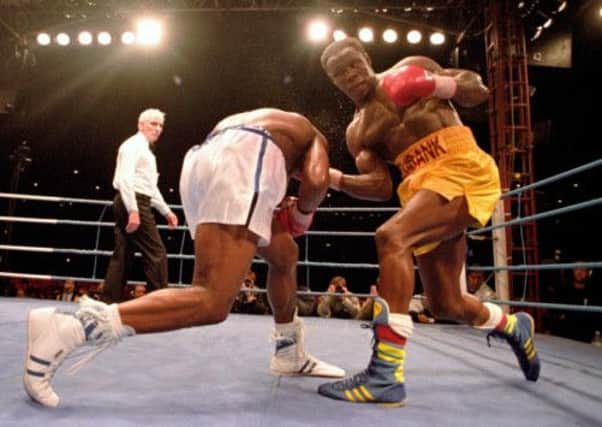Sporting Bygones: Twenty years on, and the rivalry between Eubank and Benn still lives in memory


Assigning such episodes an order of greatness is an entirely subjective and ultimately futile exercise: who can say if Willie Pep’s featherweight wars with Sandy Saddler were any less enticing than Robinson-La Motta, or Tony Zale’s trilogy with street tough Rocky Graziano, to name two of many?
So while sub-titling The Hate Game, Ben Dirs’s new book on the Benn-Eubank story Boxing’s Bitterest Rivalry may be stretching the point, it seems somehow fitting.
Advertisement
Hide AdAdvertisement
Hide AdThis is the hype business, after all, and it is a claim not entirely without merit: what can safely be said is that few other chapters of British boxing history have so energised and polarised the nation.
Apart from the plain fact that they could fight like hell, what made Benn-Eubank so compelling, in particular to many who would seldom previously have thought twice after turning on the ITV boxing on a Saturday night, was that the pair seemed so diametrically opposed; that rather like living in a city with two successful football clubs, it was impossible not to identify with one or the other.
In the red corner was Eubank, the eloquent and sharply-dressed maverick who strode round in jodhpurs and twirling a cane, routinely quoted Nietzsche, and who according to the promoter Frank Maloney once went cold in a meeting because he did not serve Earl Gray tea.
In the opposite corner there was his supposed antithesis, Benn, a soldier who served two tours in Northern Ireland and veered from hard discipline to total chaos, fighting on streets and developing a seemingly insatiable desire for the fairer sex: the rough, tough, brawling bad boy to Eubank’s educated insouciance.
Advertisement
Hide AdAdvertisement
Hide AdTheir respective paths to that inevitable first meeting are well known. Benn recovered from tarnishing his reputation as an up-and-coming star when he lost his Commonwealth title by sixth round stoppage to Michael Watson in Finsbury Park in May 1989; a performance so below-par some accused him of meek surrender.
Benn returned to win the WBO title and defended against Eubank in Birmingham in November 1990.
Eubank would enhance his status with two ultimately tragic wins over Watson, before the second fight with Benn ended in a draw at Old Trafford in 1993.
Twenty years have passed since that second and final meeting, and it says it all about the fame and depth of feeling their rivalry engendered that another well-told addition to the canon of intertwining stories about the pair should still be both welcome and worthy.
Advertisement
Hide AdAdvertisement
Hide AdFramed by a list of impeccable sources, Dirs digs deep behind the scenes to uncover fresh anecdotes and is particularly good at exposing the myths which helped the Benn-Eubank story evolve into a position where it could so powerfully polarise public opinion.
As Dirs points out, the rich irony of the whole affair was that it was the Earl Grey-supping, Nietzsche-quoting Eubank who boasted the most impeccable qualifications to be the ‘street tough’ of the two.
Sent to live in a foster home at the age of 12, Eubank was later tracked down by his hitherto largely absent father and taken to live in the notorious Bronx district of New York, where nothing more than a survival instinct sent him to the nearest boxing gym.
But Dirs’s work suggests Eubank harboured an almost obsessional interest in Benn from the start; that from the moment he arrived in the UK chasing a professional deal, he actively cultivated an opposite identity with the specific intention of creating the sort of profile which would make an eventual bout with Benn impossible to resist.
Advertisement
Hide AdAdvertisement
Hide AdEubank went to extreme measures to achieve his transition: he would scribble big words in the palm of his hand ahead of interviews, and change to an arrogant, educated persona the moment the camera lights clicked on.
Eubank said of his rivalry with Benn: “It is like two minds which are miles apart, a street brain and a society brain.”
In fact as Eubank well knew, both himself and his great rival were cut from the same cloth, united – whether they wished it to be the case or not – both by difficult backgrounds and an enduring brilliance as soon it came to lacing on the gloves.
Bitterest rivalry or not, The Hate Game provides a fine, fresh insight into one of British boxing’s most compelling eras. It serves as both a lasting testimony and an instruction manual to future generations on how the art of media manipulation can generate both money and magic.